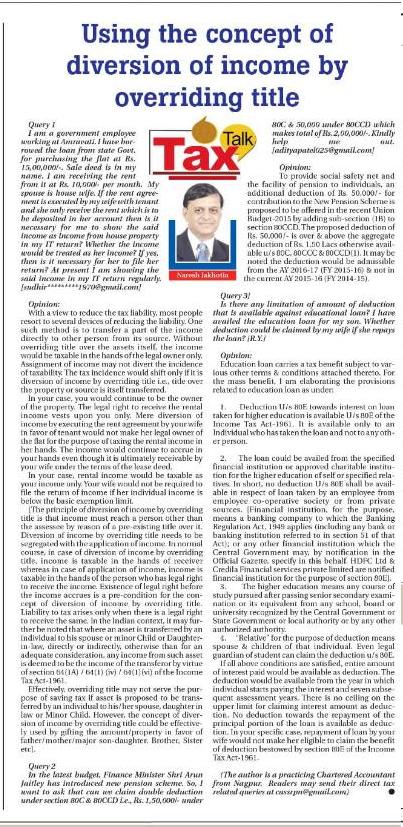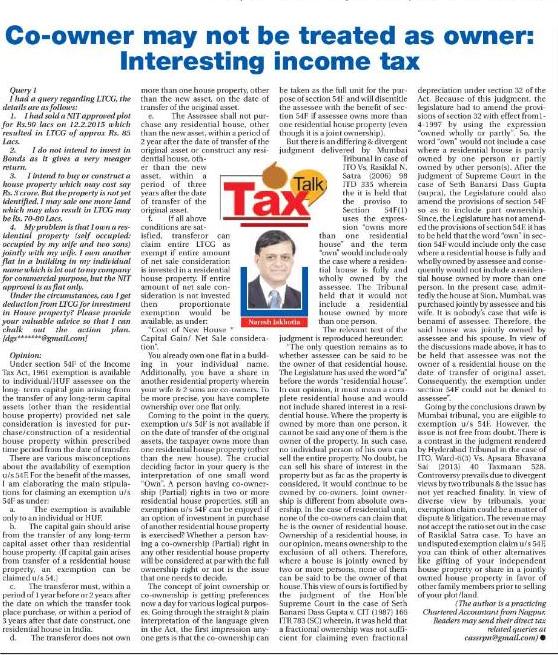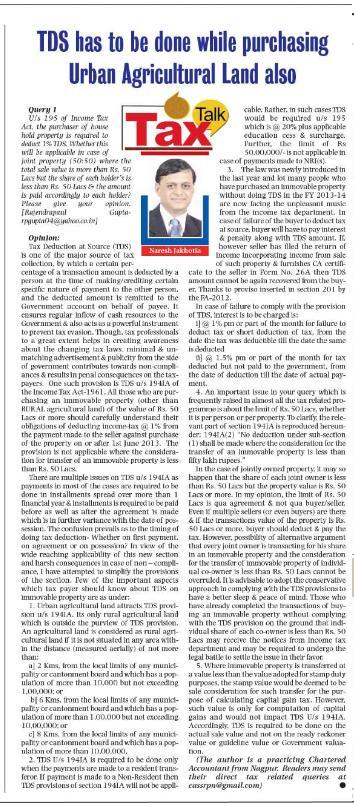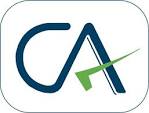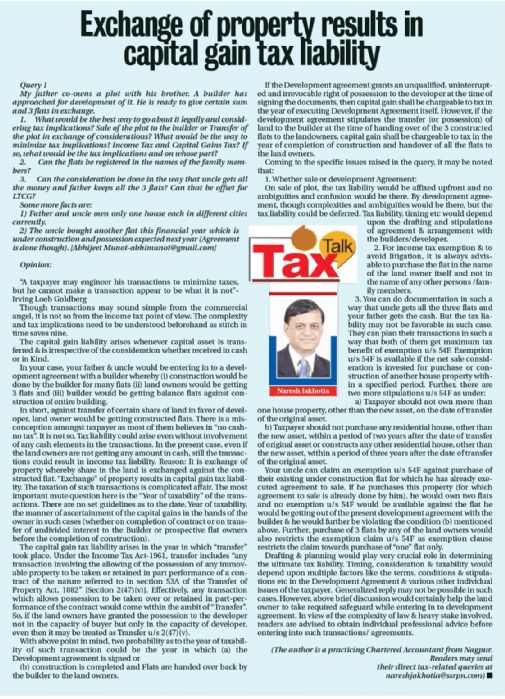Article Details
| Medical expenses offers tax benefit |
.jpg) TAX TALK-18.07.2016-THE HITAVADA
TAX TALK CA. NARESH JAKHOTIA Chartered AccountantMedical expenses offers tax benefit Query 1] First Part: I have been told that deduction is available for the expenses incurred on the medical treatment of family members. I would be thankful if you can kindly guide as to deduction admissible on medical treatment, section under which deduction is admissible and the amount of deduction permissible? [kishor*******@gmail.com] Second Part: For claiming section 80DD benefits, one needs to submit the government medical certificate. Whether medical certificate from private practitioner can also be submitted? [amitvsobti@hotmail.com] Opinion: There is no such thing as a good tax- Winston Churchill It may not be fully true if taxpayer considers the tax benefits available for medical treatment. Like food, shelter & education, Medical expenses have also become an integral part & parcel of life. Income tax Act carries a human touch & soft corner. It do offer tax benefit on the medical treatment under various sections, as under: First part: a] Deduction u/s 10 to salaried taxpayer towards medical reimbursement by employer: In case of salaried employee, Section 10 provides exemption towards the medical reimbursement provided by an employer to an employee for the medical expenses incurred on self as well as on the family members for any disease up to a maximum of Rs 15,000 per year. b] Deduction u/s 80D towards health insurance premium paid: Section 80D provides for deduction towards health insurance premium (mediclaim policy) paid & expenditure incurred on preventive health check up. Exemption limit is up to Rs 25,000 per year for self and family, for parents– another Rs 25,000 per year. However, deduction towards preventive health check up cannot exceed Rs. 5,000/-. Mediclaim insurance premium should be paid through cheque to claim the exemption. This exemption is not available for premium paid through cash. From the AY 2016-17, deduction amount could be raised by Rs. 5,000/- to Rs. 30,000/- if an individual has paid the amount towards medical expenditure of the health of parents who are very senior citizens (80 years & above). c] Deduction u/s 80DD towards medical expenditure on dependant with a disability: Section 80DD allows a deduction to an individual/HUF if any expenditure is incurred on the medical treatment (including nursing), training and rehabilitation of a dependant with a disability or paid or deposited any amount under a scheme framed in this behalf by an insurer for the maintenance of a dependant with a disability. The deduction admissible is a fixed sum of Rs. 75,000/- for normal disability and Rs. 1,25,000/- for severe (80% or more) disability [Prior to 01.04.2015, the limit was Rs. 50,000/- & 1,00,000/- respectively]. Deduction is not dependant on amount of actual expenses. Even if actual expense on above mentioned disabled dependent relative is less, still full amount of deduction would be available. What is considered as disability and Severe Disability? The following disability can be considered for deduction u/s 80DD:· . Blindness . Low vision · Leprosy-cured · Hearing impairment · Locomotor disability · Mental retardation · Mental illness · Autism · Cerebral palsy · Multiple disabilities [A person with disability means a person suffering from not less than 40% of any of the above disabilities. Severe disability means 80% or more of one or more of the above disabilities.] Meaning of Dependant: a] For individuals, spouse, son / daughter, parents, brothers & sisters b] For HUFs, any member of the HUF can be a disabled dependant. The disabled person should be wholly or mainly dependant for his / her support and maintenance, and should not have claimed deduction under section 80U. d] Deduction u/s 80DDB towards medical expenses of specified diseases/ailments: Section 80DDB provides for deduction on medical expenses incurred on medical treatment of specified diseases or ailment as prescribed by the board. Deduction is available to resident individual taxpayers on the amount actually incurred for the medical treatment of self or wholly/mainly dependent husband/wife, children, parents, brothers and sisters of the individual. [Deduction is available to HUF if the amount is incurred for the medical treatment of the any members of the family who is wholly/mainly dependent upon the family]. Deduction admissible is lower of Rs. 40,000/- or amount actually incurred. In case of treatment of senior citizen, deduction admissible could be Rs. 60,000/-. In case of super senior citizen (80 years and more), deduction could be up to Rs. 80,000/- from AY 2016-17. [Deduction u/s 80DDB would be reduced by the amount received, if any, under insurance from an insurer or reimbursed by an employer for the medical treatment of the person referred above]. To claim deduction, taxpayer have to obtain the certificate in prescribed from (Form No. 10-I) from a neurologist, an oncologist, a urologist, a hematologist, an immunologist or such other specialist as may be prescribed working in a Government hospital. From AY 2016-17, the taxpayer is just required to obtain a prescription from a specialist doctor (need not be working with Government hospital) for the purpose of availing this deduction. e] Deduction u/s 80U to a person a person with a disability: Deduction u/s 80DD is available to the person who is incurring expenditure on the medical treatment of a dependant. If the person with disability is not dependant, then he himself can claim deduction u/s 80U. Deduction is a fixed sum of Rs. 75,000/-. A higher amount of Rs. 1.25 Lakh is available as deduction if the person is suffering with severe disability (80% or above). Second part: For claiming deduction u/s 80DD, taxpayers have to furnish a copy of the certificate issued by the “medical authority” in Form No. 10-IA in the case of person suffering from autism, cerebral palsy or multiple disabilities or in the form prescribed under Persons with Disabilities Act in any other case. Where the condition of disability requires reassessment, a fresh certificate from the medical authority shall have to be obtained after expiry of the period mentioned on the original certificate in order to continue to claim the deduction. “Medical authority” for this purpose means any hospital or institution specified by notification by the appropriate government for the purpose of the Person with Disabilities (Equal Opportunities, Protections of Rights and Full Participation) Act-1995. In short, certificate from any private practitioners would not serve the purpose for claiming deduction u/s 80DD. Query 2] Can a pensioner like self retired person from Indian army, aged 54 years can join NPS? If so, will he get Rs. 50k tax benefit under the given section? [Devanand Roy-royanandd@hotmail.com] Opinion: Section 80CCD(1B) in the Income Tax Act-1961 offers an additional deduction of Rs. 50,000/- to the taxpayer for contribution in the National Pension Scheme (NPS). The deduction is over and above the deduction of Rs. 1.50 Lacs available u/s 80C for contribution in LIC/PPF/NSC etc. Deduction of Rs 50,000/- under 80CCD (1B) is available to all the individuals who has not completed 60 years of age. Pensioner as mentioned in the query can also invest and save tax through NPS. [The author is a practicing Chartered Accountant from Nagpur. Readers may send their direct tax related queries at SSRPN & Co 10, Laxmi Vyankatesh Apartment C.A. Road, Telephone Exch. Square Nagpur-440008 or email it at nareshjakhotia@ssrpn.com] |
 |




.png)
